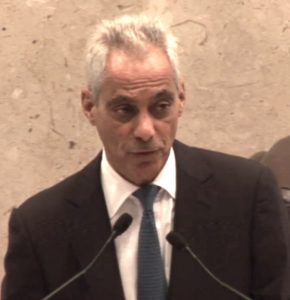Chicago hikes tax on e-cigarettes, liquid nicotine
By Kevin Beese Staff Reporter — October 30, 2018
Chicago Mayor Rahm Emanuel praises aldermen for supporting his proposed tax increase on e-cigarettes and liquid nicotine. The new tax on liquid nicotine, passed at Thursday’s City Council meeting, is more than double what it was. Emanuel said the move would keep more young people from vaping. (Photo from city video)
Chicago is taking steps to curb vaping, e-cigarettes and youth smoking.
The new efforts will increase the taxes for e-cigarettes and liquid nicotine, and mandate that all tobacco products and accessories, including e-cigarette and vaping products, be located behind the counter at retail stores. The ordinance, passed by the City Council on Sept. 20, aims to build on Mayor Rahm Emanuel’s efforts to curb tobacco use that has led to historic lows in youth smoking in Chicago.
“Ninety percent of smokers started in their teens,” Emanuel said. “E-cigarettes’ original marketing was about cessation. Nothing in their marketing now is about cessation.”
Emanuel said he is happy the city has taken a stand against tobacco use.
“I am proud to stand with Chicagoans as we say ‘no’ to Big Tobacco, ‘no’ to deceitful marketing that hook our youth and ‘no’ to jazzed-up versions of the same old nicotine products that harm us,” Emanuel said. “With these new measures, we will build on our historic lows in youth smoking and support the health of the next generation.”
The ordinance expands upon legislation introduced to the council by Ald. Ed Burke (14th Ward) in May.
The new ordinance calls for:
- Increasing the tax on e-cigarettes: Expanding on Finance Committee Chairman Burke’s ordinance, Emanuel’s proposal increases taxes on liquid nicotine, found in vaporizers and e-cigarette products, and extends the tax to e-cigarette devices that are packaged with liquid nicotine products. The tax is currently 80 cents per device or container and 55 cents per milliliter of liquid nicotine and created $772,000 in revenue for school-based health services last year. The new ordinance increases those taxes to $1.50 per device and $1.20 per milliliter.
- Restricting e-cigarette products to behind the sales counter: The ordinance mandates that all tobacco products and accessories, including e-cigarette and vaping products, are behind the sales counter rather than in front of consumers at the point of sale.
“I applaud these innovative policies to keep harmful tobacco products out of the hands of our young people,” Burke said. “Building on our past success, this package of restrictions is the next step in our goal to create Chicago’s first tobacco-free generation.”
“For decades, Big Tobacco has employed shrewd tactics to hook young people on this deadly habit,” said Chicago Department of Public Health Commissioner Julie Morita M.D., “but Chicago fights back. This ordinance follows innovative strategies like banning flavored tobacco sales near schools and raising the purchasing age to 21, that not only set new national standards for other cities, but, most importantly, help keep our children health and tobacco-free.”
This year marks the 20th anniversary of the settlement that forced tobacco companies to stop marketing to children and pay states hundreds of billions of dollars to recover taxpayer dollars spent on treatment of tobacco-related illnesses.
“E-cigarettes, which contain nicotine, are addictive and pose a clear and present danger to our youth,” said Joel Africk, president and CEO of the Respiratory Health Association. “Raising the tax on e-cigarettes is a proven strategy for discouraging youth from using these products, and it will bring us one step closer to a smoke-free generation.”
“Big Tobacco is always changing up its marketing tactics to create a new generation of people using its products,” said Dr. Robert Winn, cancer center director for University of Illinois Hospital. “The more we can do to reduce youth exposure to tobacco displays and other marketing, the better.”
Youth smoking in Chicago hit a new low from 13.6 percent in 2011 to 6 percent last year — a nearly 60 percent decline, according to the CDPH’s Healthy Chicago survey.
Get your free subscription of the Cook County digital edition
Past city action regarding smoking includes incorporating e-cigarettes as part of the Clean Indoor Air Ordinance, banning the sale of flavored tobacco near high schools, raising the tobacco-purchasing age to 21 and banning redemption of tobacco coupons.
Chicago was the first big city to impose a tax on e-cigarettes; and the city has the highest combined cigarette tax in the nation. Chicago’s smoke-free environments include all parks, marinas and beaches.
As a result of the city’s ordinance prohibiting the sale of flavored tobacco within 500 feet of a high school, the city’s Department of Business Affairs and Consumer Protection Tobacco Sales to Minors team investigated 1,237 tobacco retailers in 2017, finding 13 percent out of compliance and issuing 165 citations.
In April, the city required health-risk warning signs and the city’s quit line telephone number at the doors of all tobacco dealers. The city has also prohibited all free sampling of tobacco products.
— Chicago hikes tax on e-cigarettes, liquid nicotine —-







